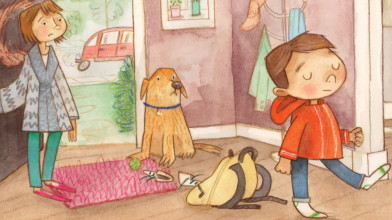Preview:
Ginger Hubbard: “Mom, you said that we’re not allowed to be playing down in the creek and Wesley is down there catching tadpoles in it.” Now, I’ve told you that Alex is my theatrical child-
Jim Daly: Yes.
Ginger: … so you could always tell exactly what she was thinking. I could tell she was totally thinking, “So what are you going to do about it and can I watch?”
John: (laughing)
Jim: Yeah.
End of Preview
John Fuller: Ginger Hubbard talking about a challenge she had with her daughter and how we as parents can sometimes get off track and lose sight of the bigger picture. This is Focus on the Family with your host, Focus president Jim Daly. I’m John Fuller. And Jim, it seems that despite all the good books and resources, you have to kind of learn on the job as a mom or a dad, and we can laugh about those mistakes in the past, but when you’re in the thick of it, oh my goodness. It can be frustrating.
Jim: John, the two of us of all people know that book smarts only go so far, right? (laughing) We sit here every day with great guests and many of them talking to us about parenting.
John: Mm-hmm.
Jim: And then we gotta go home and apply it.
John: And good luck-
Jim: (laughing) Yeah.
John: … with that.
Ginger: Yeah.
Jim: I would only say, “Who hasn’t made mistakes in parenting their kids?”
John: Hmm.
Jim: And, uh, that’s just part of life. Uh, Ginger Hubbard is back with some great advice for parents, and she’s been, uh, well received by our listeners, you, and I think you’re gonna enjoy once again hearing from her. Her wonderful book, I Can’t Believe You Just Said That! Love the title, by the way. And I think it is packed with biblical wisdom to help parents do the job well. Uh, she wrote the book to provide a toolbox for parents to use in training up a child, uh, with scripture, and I’m looking forward to it. So let’s get to it. Ginger, welcome back to Focus.
Ginger: Thank you. It’s great to be back.
Jim: All right. Uh, you heard the setup there. Uh, (laughs) parents are imperfect, aren’t they?
Ginger: That’s right.
Jim: (laughing) Let’s all-
Ginger: They are not. We can-
John: Kids are too, for the record.
Ginger: Yes, yes, yes.
Jim: Even perfect parents are imperfect. (laughing)
Ginger: That’s right. That’s right.
Jim: Uh, wh-, one of the common mistakes that we can make is threatening our kids too much. I mean, that’s one of, maybe bribing them.
Ginger: Mm-hmm.
Jim: There’s always those things.
Ginger: Mm-hmm.
Jim: Why is that not a smart approach?
Ginger: When we fall into the traps of things like bribing and threatening and-
John: And counting.
Ginger: … repeating our, and counting-
John: (laughing)
Ginger: … to three. That’s why I named my first book-
Jim: Count to three.
Ginger: … Don’t Make Me Count to Three because that was my favorite one.
John: (laughing)
Ginger: Uh, when we fall into those traps, it really, um, keeps us from getting to the heart of the issue because those things, if you think about it, they may manipulate the child’s behavior to some extent, but they fail to reach the heart. So that’s why we don’t want to fall into those. And you know, like threatening, y-, you brought that up. Um, usually-
Jim: (laughs) I would.
Ginger: Y-, yeah. (laughing)
Jim: That’s part of my go-to thing.
Ginger: Yeah, we’ve all done that. I’ve done that too and I’ll share a story about that. But threatening usually comes after we have repeated our instructions several times to no avail and so we pull out the big guns. Something like, “If you don’t start sharing your toys right now, I’m gonna send ’em all off to kids who will share.”
Jim: (laughing)
Ginger: See, that teaches them that mom or dad do not mean what they say.
Jim: Let me, let me dissect this a little bit.
Ginger: Mm-hmm.
Jim: First of all, why do we as parents, you know, brilliant as we are-
John: (laughs)
Jim: … as adult parents, why do we say something that’s so utterly ridiculous that not even our kids believe it?
Ginger: I think a lot of the times we fall into these traps of-, of saying things like that and counting to three because disciplining our children is unpleasant. We don’t wanna have to discipline our kids, so we find ourselves throwing out threats and throwing out bribes and counting to three because discipline, let’s face it, it’s unpleasant.
Jim: Right.
Ginger: I know of nothing harder when my kids were growing up, I knew of nothing harder when my kids were growing up than administering consequences. To administer consequences on somebody that we love so much, we don’t wanna see our kids suffer consequences.
Jim: It is hard to do.
Ginger: It’s unpleasant-
Jim: (laughs)
Ginger: … for us and it’s unpleasant for them, so we try to avoid that. But Hebrews says, “There is no discipline that seems pleasant at the time but painful. Later on, however, it produces a harvest of righteousness and peace for those who have been trained by it.”
Jim: And that’s so good. E-, eh-, and you alluded to this, but it, it’s almost like the short-term gain of the win, uh, blinds us to the long-term importance of developing the character.
Ginger: That’s right.
Jim: So we get ’em to clean their room or we get ’em to eat their green beans-
Ginger: Mm-hmm.
Jim: … but we’ve failed to understand that we may have missed it by all the threats.
Ginger: Yes.
Jim: And one of my biggest threats, I can remember being at Disney Land, yes we did, the kids were probably like eight and six and we had a little problem, a little-
Ginger: Mm-hmm.
Jim: …. meltdown.
Ginger: Yeah.
Jim: Course my big threat was, “You will never come here again.” (laughing) And we-
Ginger: Right.
Jim: You know, not a smart one either because-
John: Yeah.
Ginger: Right.
Jim: … we-
Ginger: Right.
Jim: … at that time, you know, enjoyed going to Disneyland more often that we should probably.
Ginger: Right.
Jim: And you had one with your, your grandparents became the threat? (laughs)
Ginger: Yes. My kids spent the night, it was so wonderful. Uh, they had wonderful grandparents. My parents are just amazing. And so once a week, they would have my kids spend the night with them. And it-
Jim: Ugh.
Ginger: … yeah, it was wonderful.
Jim: I’m jealous. Mm-hmm.
Ginger: I know.
Jim: That’s great.
Ginger: And so they have a really close relationship with them.
John: Are they s-, are they taking reservations for other people?
Ginger: (laughs) They love kids, they probably would. But yes, I remember, um, one day I had been telling the kids all day that they needed to hurry up and get their rooms cleaned up, and they were just procrastinating-
Jim: (laughs)
Ginger: … and just not doing-
Jim: Yeah.
Ginger: … what I was telling them to do. And so I pulled out the big guns. I threw out a threat and I said, “If you guys don’t hurry up and get these rooms cleaned up, you are not spending the night with Nana and Poppa tonight.” Okay, I knew good and well I wasn’t about to forfeit my night-
Jim: (laughs)
Ginger: … with no kids.
Jim: That was more about you and your husband. (laughs)
Ginger: Yes, if I were to follow through with that threat. And so, you know, in Matthew it says, “Simply let your yes be yes and your no be no.” Because anything beyond that’s going to cause confusion. That means that we have to think before we speak. We need to try not to say yes or no to something or I-, issue that warning or that command unless we’re certain that we wanna follow through with it.
Jim: Right, and so before-
Ginger: And then it’s not a threat.
Jim: … before you speak, make sure you’re gonna follow it through.
Ginger: That’s right.
Jim: That’s always a good rule.
Ginger: That’s right. So if you’re gonna tell your kids, “If you don’t start sharing your toys right now, I’m gonna pack ’em up and ship ’em off to Timbuktu”, you better follow through with it.
John: (laughs) So, so did they go to the grandparent’s house or not?
Ginger: They did.
John: Okay.
Ginger: I didn’t follow through on my threat. (laughing)
Jim: You didn’t have to ask that. You’re outing her.
Ginger: You just caught me. See, and I, and I read all the parenting books and even wrote a couple of ’em, but I still-
John: (laughs)
Ginger: … fell into some-
John: Yeah, we all do.
Ginger: … of these traps. We all do.
Jim: That’s good to hear actually, Ginger.
Ginger: Yeah.
Jim: Hey, uh, you mentioned the three-step plan for taming the tongue.
Ginger: Mm-hmm.
Jim: Uh, some may know about that, but describe what that is.
Ginger: Okay. There’s three steps that is pretty much th-, forms the common denominator of every chapter in the book. Every chapter is like a different tongue-related offense, like lying-
John: (laughs)
Ginger: … whining, tattling. Um, you know, everything that I could think of. And so step one is heart-probing questions because when we ask those heart-probing questions-
John: Yeah.
Ginger: … that helps our children to evaluate themselves rather than us just telling them what their problem is and what ought to do about it. Because that-
Jim: The lecture.
Ginger: Yeah.
Jim: Yeah.
Ginger: Because that hinders them from learning how to think like a Christian.
Jim: You know, let’s punch this point here-
Ginger: Mm-hmm.
Jim: … because I’ve heard from a number of experts here at the microphones-
Ginger: Mm-hmm.
Jim: … that, uh, avoid the lecture and go to the heart-probing questions.
Ginger: Mm-hmm.
Jim: You’re saying exactly (laughs) that again.
Ginger: Yes.
Jim: And, uh, unfortunately for parents, uh, again, we have to control the urge to go to the lecture-
Ginger: Right.
Jim: … to tell our children all our wonderful wisdom, which is plentiful.
Ginger: Right. (laughs)
Jim: And then, and then to go to the questions.
Ginger: Yes.
Jim: Much like Jesus did.
Ginger: That’s what he did.
Jim: Isn’t that interesting that-
Ginger: That is exactly-
Jim: … Jesus asked a lot of questions?
Ginger: He did.
Jim: Not that he didn’t know the answer.
Ginger: Right.
Jim: I mean, come on.
Ginger: Yes.
Jim: He was doing that to benefit the listener.
Ginger: That’s right. And Jesus-
Jim: Think it through.
Ginger: Yes. And Jesus was a skilled heart-prober. He knew how to ask those questions in such a way that it would cause the people to take the focus off of the circumstances and the situations around them and onto the sin in their own heart. So that’s what we wanna do. And also when we ask those heart-probing questions and our children have to evaluate what’s going on inside them, that helps them to not only recognize what’s there but to also take ownership for the sin that’s in their heart, and that’s gonna help them ultimately recognize their need for Christ.
Jim: Yes.
Ginger: So the heart-probing questions, that’s so much better than just pointing our finger and, and giving this lecture.
Jim: Yeah.
Ginger: Because that helps them to think like a Christian. When we just always tell them the answer and what they oughta do about it, we’re hindering them from learning how to think like a Christian and they can become handicapped in the area of discerning matters of their own heart.
Jim: Mm-hmm. Yeah. Uh, age-appropriateness has to play into this obviously.
Ginger: Mm-hmm.
Jim: I would think some parents they linger, uh, a little too long at, with those question types.
Ginger: Mm-hmm.
Jim: Like what you would ask an eight-year-old wouldn’t be a 16-year-old, but-
Ginger: Right.
Jim: … I can hear a few moms and maybe some dads-
Ginger: Yes.
Jim: … who are still maybe treating that 16-year-old like an eight-year-old.
Ginger: Right.
Jim: So speak to the differentiation of age-appropriate questions and how you do that.
Ginger: Okay. All right. Well, let’s say that, um, a child disobeys. A young child, ’cause that’s pretty much the first thing they’re gonna do wrong is they, you don’t have to teach them how to disobey-
Jim: No.
Ginger: … that comes naturally.
John: They come pre-wired for that.
Ginger: That’s right. So they’re gonna be young when they start that. So just two or three very simple age-appropriate questions might be, “Honey, did you obey or did you disobey?” Again, that helps them to take ownership and-
Jim: Right, and they have to think about it.
Ginger: … e- even… Yeah, and even if they don’t answer it, even if you have to answer for them, they’re still contemplating that question, and, and they’re still answering it in their hearts and in their minds. And then maybe, “How did you disobey?” So that they actually have to verbalize. Or if they don’t answer again, don’t get into a power struggle, answer for them. “Well, I told you to go clean up your toys and you didn’t and so that’s disobeying.” So that’s just a couple of heart-probing questions for young children. All right, so let’s go a little bit older and say, uh, disrespecting. You know, when they start getting into the pre-teen, teen years, that’s pretty common.
Jim: Pfft. Pfft. Pfft.
Ginger: (laughing)
Jim: Whatever.
Ginger: Yeah.
Jim: That one? That, that? (laughing)
Ginger: Yes, yes.
John: You have friends with kids that age, right?
Jim: Yeah, I’ve experienced that a couple times.
Ginger: Yeah. So you know, say that a child speaks disrespectfully. The typical parent is going to say something like, “That was disrespectful. No TV for you tonight. Now go to your room.” And see, they think that they’ve done well because they have identified exactly what it is the child was doing wrong. He was being disrespectful and they gave him a consequence for it. But we need to not only do that, we need to teach them not just what is wrong, but what is right. So you would want to have the child not just suffer the consequence, but to come back and practice communicating the right way by using the appropriate words and the appropriate tone of voice. And for many kids, particularly mine as they grow into their teen years, the appropriate facial expression.
Jim: (laughing) Appropriate.
Ginger: Yeah.
Jim: Yeah. We’re getting down to the non-verbals.
John: Yeah.
Ginger: That’s right.
Jim: No, that’s good.
Ginger: So and that kinda moves into the other two steps. You know, the heart-probing questions, that’s important and yes, you need to word them age-appropriately. Much simpler when they’re younger, a little more mature when they’re older ’cause we wanna show respect for their age and talk to them like the young adults that they’re growing to be into. So that moves into the two-step plan in that we, it’s never enough to tell our children what not to do. We always need to take it a step further and teach them what to do. How to replace what is wrong with what is right. And that, step one is the heart-probing. Steps two and three come from that verse in Ephesians that says that we are to put off our old selves, which is being corrupted by deceitful desires and to be made knew in the attitude of our mind, and to put on our new self. See, when we correct children for wrong behavior but don’t follow through in training them in right behavior, we will exasperate them.
Jim: Mm-hmm.
Ginger: Because we’re not teaching them what to put on. We’re just teaching them in what to put off. And I think about that verse in Corinthians, um 10:13, I think. 1 Corinthians 10:13 that says that when we’re tempted, God is faithful. He will not let us be tempted beyond what we can bear. But when we are tempted, he will also provide a way out.
Jim: Hmm.
Ginger: So again, when we only correct our children for wrong behavior but don’t train them in the right behavior, don’t follow through with that most important step, we’re going to exasperate them because we’re not providing them with that means of escape. We’re not giving them that way out. And according to the scripture, that sort of neglect can provoke children to anger.
Jim: That is really good.
John: Hmm.
Jim: I mean, that is really good. Uh, let’s get practical.
Ginger: Okay.
Jim: I mean, lying is probably one of the most common things children will do.
Ginger: Mm-hmm.
Jim: An-, and nobody wants to be caught, right?
Ginger: Right.
Jim: Whether it’s hand in the cookie jar, and you can speak to that age-appropriate lying-
Ginger: Yeah.
Jim: … modality.
Ginger: Yeah.
Jim: But, um, do that. What’s, uh, the typical lies that parents should be, uh, concerned about? Maybe all of ’em.
Ginger: Mm-hmm.
Jim: But, uh, give us a degree of the lie and then how to respond to that.
John: Mm-hmm.
Ginger: Okay. Well, and I remember, I, I think I’ve touched on this last time when we were, uh, on the show together, but I re-, I don’t think I went into a lot of detail about a lie that I caught my daughter in. She was probably, I don’t know, maybe four years old and one thing about my daughter Alex is she loved to play dress up and pretend. And I encouraged her to do that and she’s now an actress, so all that drama-
John: Oh, yeah.
Ginger: … paid off.
Jim: (laughs) There you go.
Ginger: And, and dressing up and playing pretend. And she loved to, um, involve our little Yorkie, our little Yorkshire Terrier in a lot of her shenanigans. And I allowed-
Jim: (laughs)
Ginger: … her to do that because he was very, you know, he would pretty much go with anything. But one thing that Alex knew that she was not allowed to do, very clear in knowing she’s not allowed to do this, she was not allowed to get into my makeup bag and play with my makeup. And so when Mickey, our little Yorkie comes prancing into the kitchen-
Jim: (laughs)
Ginger: … with lipstick on, it wasn’t hard to determine who was behind it. And so but Alex, she lied about it. You know, when I asked her, “How, how is it that Mickey came to have rosewood lips?”
John: (laughs)
Ginger: She, uh, just all the sudden says, very confidently, “Doug did it.”
Jim: Doug?
Ginger: Doug.
Jim: (laughs)
Ginger: So let me tell you about Doug. Doug is a three-inch tall caped action figure that came in a kid’s meal.
John: (laughing)
Ginger: And so Doug did it all by himself.
John: Oh.
Ginger: And so I said, “Alex.” I did something r-, that is another thing that we shouldn’t do with small children, which is try to reason with them. And I said, “Alex, Doug did not do it. Doug is not capable of going and getting my makeup out and putting it on Mickey.” So I’m trying to give her the benefit of the doubt because I don’t wanna think that she’s lying. So I’m like, “Were you just pretending? Did you and Doug go and maybe you helped Doug get the lipstick get it out of the bag and put it on Mickey?” “Nope. Doug did it all by himself.”
John: (laughs)
Jim: She was standing her ground. (laughs)
Ginger: And so after I try to reason… yeah, yeah. And so after, and then what they do, then they dig their heels in deeper and they keep having to tell more and more lies to cover the original lie.
John: Mm-hmm.
Ginger: So after I try to reason and explain that Doug could not have done it by himself, she says, “Oh yes he can because I put batteries in him.”
Jim: (laughing)
Ginger: I mean, that’s some serious thinking right there.
Jim: She’s thinking it through.
John: Yeah.
Ginger: She’s really trying to cover her, her tail here, so.
John: (laughs)
Ginger: Anyway, but that was her-
Jim: So what was the end result?
Ginger: … she was caught red-
Jim: Did she finally fess up?
Ginger: She did.
John: (laughs)
Ginger: She was caught red-handed and, um, you know, and I just talked to her about how, you know, who is the Father of Lies and who is the Father of Truth?
Jim: Hmm.
Ginger: And when you lie, you’re following and pleasing the Father of Lies, and sweetie, you want to follow and please God, the Father of Truth. And then I also talked to her about the relational consequences of lying. You know, the foundation of the family relationship is built on trust and when that trust is violated, the foundation of that relationship crumbles. And so I said, “That’s why in the Bible, God really wants us to always s-, speak truth because not only does it honor him, but that also keeps our relationships right when we trust each other.”
Jim: Yeah.
John: This is Focus on the Family and, uh, your host is Jim Daly. Our guest is Ginger Hubbard, and she’s got a great book, I Can’t Believe You Just Said That! Uh, we’ve got the book and a CD or download of our broadcast here at focusonthefamily.com/broadcast or call 800 the letter A and the word FAMILY.
Jim: Eh, let’s move to that little more serious situation. Maybe it’s 13, 14, 15-year-old.
Ginger: Mm-hmm.
Jim: And they’re having a difficult time telling the truth.
Ginger: Mm-hmm.
Jim: And that conversation’s a little different.
Ginger: Mm-hmm. I will-
Jim: Who were you with last night? What did you do?
Ginger: And you find out that they lied. Well, first off, we need to make sure, be certain that they’re telling a lie too, because to-
Jim: Right.
Ginger: … accuse a child of lying who in fact is telling the truth, that’s gonna be very discouraging-
Jim: And damaging.
Ginger: … to them. And damaging. And we d-, the last thing we wanna do is to make them feel like that we have this ongoing suspicious expectation of them lying. And you know, if, if we do in fact know that they’re lying, another thing that we don’t wanna do is to call them a liar. We don’t wanna label them a liar.
Jim: Mm-hmm. Right.
Ginger: You know, we wanna talk about who they are in Christ. And so, you know, you would say something like, even that older child, you know, “You told a lie but you are not a liar. That is not who you are.”
Jim: Yeah.
Ginger: “You are a forgiven child of God and because of his grace, just like me, you can walk in truth. And we’re all gonna blow it and, but we need to be willing to confess when we blow it and, and face the consequences.”
Jim: Yeah.
Ginger: Mm-hmm.
Jim: What’s a probing question? And say it’s pretty serious, you know.
Ginger: Mm-hmm.
Jim: I don’t know what it might be, but it’s a serious thing. What would be a probing question to kinda-
Ginger: For the older child?
Jim: For the older child to say, “D-, did you understand how that may have hurt your friends or those around you?”
Ginger: Right, that’s a good-
Jim: Something like that.
Ginger: That, that’s a great question.
Jim: “Did you understand how that would hurt your reputation?”
Ginger: Right. Right. Wh-, you know, wh-, how does that represent you to other people when you tell a lie? You know, we are also ambassadors of Christ who is truth. You know, God is truth and we are his ambassadors so we need to be representing Christ. And so when we tell a lie, you know, you might ask that child who tells a lie, “Do you think that that was a good reflection of who you are in Christ to that person?”
Jim: Yeah.
Ginger: And, and also, “How do you think it made the other person feel?”
Jim: Yeah.
Ginger: I-, if the lie did involve and hurt another person. Always try to put that child in someone else’s shoes if you knew that the lie-
Jim: That’s good.
Ginger: … could have hurt them.
Jim: Develop empathy and those kinds of things.
Ginger: Yes, yes.
Jim: I think the other thing, the other challenge a parent has there is how to be light-handed with it.
Ginger: Mm-hmm.
Jim: You know, you can ask two or three good questions-
Ginger: Yes.
Jim: … but then you need to walk away-
Ginger: Right.
Jim: … and let the child think.
Ginger: Right.
Jim: Not just keep pummeling.
Ginger: Eh-
Jim: And now, let’s go to the lecture.
Ginger: (laughs) Yeah, yes.
Jim: Now that I’ve asked you three great questions-
Ginger: Yes.
Jim: … let me give you my five-minute lecture.
Ginger: (laughs)
Jim: Um, you’ve got to be able to pull back, right?
Ginger: Right, and, and-
Jim: And give them space.
Ginger: That’s right. And sometimes they need, no matter what they’ve done wrong, whether it’s lying or defying or, or whatever, sometimes they need some time to ponder it. So ask them those questions and then maybe have ’em go to their room and, and take a little time to ponder what they did, what they should have done instead. And even with lying, um, you wanna have them come back and talk about what the should have done instead.
Jim: Yeah.
Ginger: And you know, also we need to be willing to share our struggles. You know, all of us have lied at wh-, one time or another. We all are gonna struggle with that and we need to be willing to humble ourselves and go to our kids and perhaps tell them about a time that we told a lie and what the consequences were and why it would have been so much better to be truthful in the first place.
Jim: Hmm.
Ginger: Even if we, even if it was hard to be truthful, it is always the best thing to tell the truth.
Jim: No, that’s good. All right, let’s move to defiance. Uh, defiance is, uh, another behavior that parents have to deal with. I mean, it’s one of those normal things that kids tend to express.
Ginger: Mm-hmm.
Jim: Um, you weren’t against making excuses for kids, uh, who defy mom or dad, so tell me why.
Ginger: We don’t wanna make excuses for their behaviors because then we’re not, again we’re not taking the time to train them in what is right. I was in, um, I have a really good story about that. I was in Chick-Fil-A, ugh, I don’t know, years ago. And it’s typical Chick-fil-A where there’s like, you know, 10 registers, a bazillion people in line.
Jim: (laughs) Right.
Ginger: And I’m in the back of one of these lines, and standing beside me is this mom with her two small kids. And for th-, uh, probably the first five minutes they were behaving very well. I mean, I was, I was looking and I’m thinking-
Jim: You were impressed.
Ginger: … “Wow, these…” Yes. It’s like, “Wow.” And I don’t know what happened because I didn’t see what happened before this, but what I did see is all of the sudden, one sibling rears back and slaps the other sibling upside the head.
Jim: Hmm.
Ginger: And this frazzled mom looks at her child as if he had turned into a green three-headed alien and she says, “Why do you act like that?” And you know, I wanted to butt in. I didn’t, but I wanted to butt in and say, “Because he’s a sinner.”
Jim: (laughs)
Ginger: Why wouldn’t he act like that?
Jim: Right.
Ginger: The quest-
Jim: Well, excuse me mother, I act like because I’m a sin nature-
Ginger: (laughing)
Jim: … and therefore I follow my flesh often.
Ginger: Right.
Jim: You’re not gonna that answer probably.
John: (laughing)
Jim: (laughs)
Ginger: That’s right. And so instead, uh, you know, and, and so I wanted to say, “Because he’s a sinner, why wouldn’t he act like that?” The question is now “Why does he act like that?” The question is, “What are you going to do about it?” Are you going to take this opportunity to train him in what’s right and use this as a precious moment to instill wisdom in the heart of your child or are you going to allow that sin to take root in his heart and grow? And then, I’ve, and I’ve done this too, I’ve made excuses for my kids and tragically, that’s what this mom chose to do.
Jim: Sure.
Ginger: She was embarrassed. We’ve all been embarrassed by things that our kids do, so I could relate to her being embarrassed. But she looks around, instead of addressing it with her child-
Jim: (laughs)
Ginger: … she looks at all of us standing in line and she feels the need to make excuses and she says that her son is just so tired.
Jim: Right.
Ginger: He hasn’t had a nap and he’s really hungry. And so, you know, at this point, I wanted to just say, “Well, I’m tired and hungry too-
Jim: (laughs)
Ginger: … but I’m not going to slap you upside the head.”
Jim: (laughing)
Ginger: Now, we do need to, we do need to realize though that these sort of conditions can play a part in, in behavior with small kids, but sin is sin and wrong is wrong. Even if you are tired and hungry, it is sinful to slap somebody upside the head. There’s nothing in the scriptures that validates the neglect of training because the child is tired or hungry.
Jim: Yeah.
Ginger: Yeah.
Jim: Y-, you tell a story about your daughter, Alex tattling on her brother. Tattling’s another one. You know, we go from the lying to, hey, telling-
Ginger: Mm-hmm.
Jim: … all the truth on your sibling. (laughs) But not yourself.
Ginger: Yes. Yes.
Jim: Um, describe tattling, I guess the definition of it and then how do you deal with it as a parent? ‘Cause some of that intel is pretty good.
John: Hmm.
Ginger: Yeah. (laughs) Well, tattling is not a good thing because first, it’s really going to create, um disharmony in the relationship of the siblings because of-
Jim: Lack of trust.
Ginger: … lack of trust.
Jim: Yep.
Ginger: And, uh, yeah, and I remember Alex really struggled with tattling for a while and I remember she, I think she and her brother were probably arguing about something outside because, uh, sh-, anytime they were arguing, that’s typically how it ended would be with her coming to tattle to try to get him in trouble. So I remember I’m in the kitchen, she comes running in the house and she says, “Mom, you said that we’re not allowed to be playing down in the creek and Wesley is down there catching tadpoles in it.”
Now, I’ve told you that Alex is my theatrical child-
John: Yes.
Ginger: … so you could always tell exactly what she was thinking. I could tell she was totally thinking, “So what are you going to do about it and can I watch?”
John: (laughs)
Jim: Yeah, ’cause this’ll be entertaining.
Ginger: That’s right. Now see, now if I were in the middle of something or in the heat of the moment, I might find myself and I did sometimes, not relying on God’s wisdom but my own. And in doing that, that would look like, “Okay, well just go tell Wesley to come here and I’ll deal with it.”
Jim: Oh, geez.
Ginger: But in doing that, I would fail to pull out what’s going on in her heart-
John: Yeah.
Ginger: … and what God says about tattling. And so I might as-, I always started out with a heart-probing question. So I might say, you know, “Alex, honey, could it be that you are delighting in getting your brother in trouble?” Now, when I asked that question, she looked as if she were considering that question and leaning toward the “yes” end of it.
John: (laughing)
Ginger: And so I reminded her about, um, the verse in Proverbs that says, “He who is glad at calamity will not go unpunished.” Now, calamity is a big word and she was a little girl, so I worded it the way she could understand it. I said, “Honey, if you are delighting and taking joy in getting your brother in trouble, then you will get in trouble because that’s not right.” And so that’s what to put off, tattling. And then what to put on, which is step three is encouragement. And so I might say, you know, in Hebrews, it says that we’re to spur one another on toward love and good deeds. “What could you have said to Wesley to encourage him to do the right thing?” Which would be not to play in the creek because they weren’t allowed to be playing in the creek. “Okay, well that’s good. Go back and say those words to him and encourage him.” And you know, when siblings are taught to spur one another on towards what’s right instead of trying to take delight in getting them in trouble, boy, that’s really builds-
Jim: Hmm.
Ginger: … cultivates unity in that sibling relationship.
Jim: Yeah, and that, this is good. Uh, f-, for the parent who is listening saying, “Man, it’s just too late. You know, my kids are in their teens or maybe their later teens and a lot of their behavior is manifesting now-
Ginger: Mm-hmm.
Jim: … and I haven’t done enough to ask the right questions, to guide them, et cetera.”
Ginger: Mm-hmm.
Jim: Is their hope for them?
Ginger: There is definitely hope and you know, God is sovereign. He knew that they would be hearing some of the things that they’re hearing today on Focus on the Family and God wants them to be encouraged with what they’re hearing. And so it is never too late to start. So to that parent, I would say you know, it may be necessary, um, just to go to your child and just apologize and just say, “You know, I, I heard some things that, um, that God tells me to do in the Bible about that it’s my responsibility to train you in wisdom and to train you in what’s right, to teach you to obey. And you know, I haven’t been doing that.”
Jim: Hmm.
Ginger: “And so, will you forgive me?” And then just go over the new standard and talk about what the Bible says about the parent’s responsibility and the child’s responsibility to respond to the parent in obedience and then just start fresh.
Jim: Yeah. Uh, what wonderful insights that you have.
Ginger: Mm-hmm.
Jim: And you’ve packed ’em all into this great book, I Can’t Believe You Just Said That! And I guess I would say, “I can’t believe you just said that.”
Ginger: (laughing)
Jim: All that good stuff. And for parents who, you know, feel like they’ve blown it, like every parent does at some point-
John: Mm-hmm.
Jim: … this will give you really practical, um, insights on how to train up your child at age-appropriate stages to say the right things, to ask the right questions.
Ginger: Uh-huh.
Jim: To encourage them in the right direction in their faith and in their maturity-
Ginger: Mm-hmm.
Jim: … emotionally. So thank you so much for being with us.
Ginger: Thank you.
John: Well, we’ll invite your call. If you have any questions about getting a copy of Ginger’s book or if you’re just in a dead-end spot in your parenting and you need some encouragement. Uh, we have a lot of resources, we have some great folks on the phone and even a counseling team, uh, if you need something a little more in-depth. Uh, call today. Our number is 800 the letter A and the word FAMILY. Or online you can find the help you need at focusonthefamily.com/broadcast.
Jim: You know, John, also we often say this, but we wanna get this resource into your hands, so uh, we are listener supported. If you can make a gift of any amount, maybe become a monthly pledger to Focus, um, or if you can just make a one-time gift, uh, we’ll send the book by Ginger Hubbard, I Can’t Believe You Just Said That! as our way of saying thank you. And if you can’t afford it, we want you to be the best parent you can be. We’re f-, um, trusting that the Lord will, uh, provide enough through other friends that if you seriously cannot afford it, just get ahold of us and we’ll get it into your hands on a faith basis.
John: Mm-hmm.
Jim: So thank you for doing that and we appreciate your prayers and support.
John: And again, our number is 800 the letter A and the word FAMILY. Well, on behalf of Jim Daly and the entire team, thanks for joining us today for Focus on the Family. I’m John Fuller inviting you back as we once again help you and your family thrive in Christ.
























